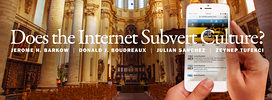I really like Zeynep Tufekci’s positive attitude and mostly agree with her. Of course learning from and being influenced by other cultures is not new – it is likely older than our species! I discuss this at greater length elsewhere but I had hoped that, in my essay, I was making it clear that what the Internet does is to greatly accelerate a trend that began with reading books, was amplified by film, radio, and television, and has truly taken off today. I think the main difference between my perspective and that of Tufekci is that my starting point is always that we evolved as hunter-gatherers and remained so for almost all of our existence as a species, and that there has simply not been time for evolution to have produced major psychological changes across human populations.[1] Thus, our brains are still adapted to earlier environments so that a culture-editing mechanism which until recently produced largely adaptive results is today having unpredictable effects. Tufekci is comparing the world of television to the world of the Internet. Naturally, she sees much smaller differences than I do, since I am comparing the Internet world with the small-scale, band-level, hunting-gathering world in which our species evolved and has mostly lived. Since the difference is one of perspective, we are both right.
Tufekci’s most valuable contribution is her point that respecting non-local Internet figures can have very positive effects. Would North Korea, for example, survive in its current state if the population had free access to the Internet? Its government obviously does not think so, and efforts to control Internet content and access by non-democratic governments are unfortunately common. Moreover, as I discuss, during times of rapid social change, such as the rapid rural-urban migration that has affected and continues to affect most of the world, parents and local prestigious figures may have limited relevant knowledge to offer. And thus respect for and learning from non-local figures may be essential. The Internet’s facilitation of preferential attention to non-local figures is leading to much disruptive change, but disruptive change can be good.
[1] After all, there is no evidence that there are genetically based psychological differences between people whose ancestors left off hunting-gathering 14,000 years ago, and those who are still hunter-gatherers today.

